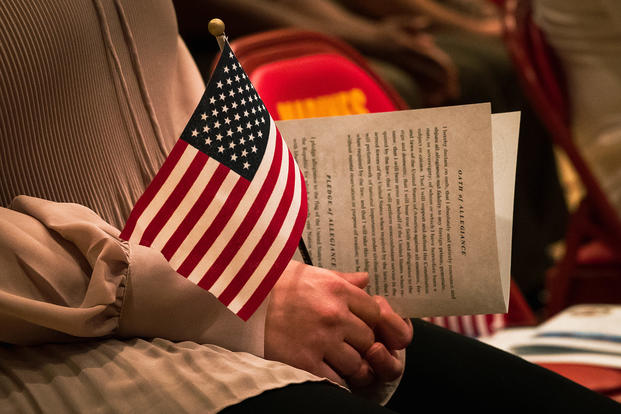Sixteen immigrant veterans and service members' relatives who were deported have been allowed back into the United States over the last year under a temporary status known as humanitarian parole, the Department of Homeland Security said this week.
Of the 16, four have since completed applications for naturalization and are now U.S. citizens, a DHS spokesperson told Military.com in an email Thursday.
The release of the numbers comes a day after officials from DHS, the Department of Veterans Affairs and the Pentagon testified to a House Judiciary Committee subpanel about immigrant service members and veterans.
Read Next: Army Swiftly Backpedals on Policy Dropping High School Diploma Requirement
The officials fielded questions from Democrats, who pressed them to do more to ensure immigrant service members get citizenship and deported veterans are brought back, and from Republicans, who sought to frame the deported veterans as dangerous criminals.
The Biden administration has been reviewing deported veterans' requests for humanitarian parole under a program launched last year called the Immigrant Military Members and Veterans Initiative, or IMMVI, a partnership between DHS and the Department of Veterans Affairs aimed at streamlining resources for noncitizen service members and veterans.
Between the program's launch in July 2021 and June 21, 56 veterans and family members have formally requested humanitarian parole, which allows people otherwise ineligible to enter the United States to temporarily come into the country for emergency humanitarian reasons.
The formal requests for humanitarian parole are a fraction of the 144 informal inquiries IMMVI has received since its launch, IMMVI director Debra Rogers said at Wednesday's House Judiciary Committee immigration subcommittee hearing. She attributed the low number to veterans' lack of access to legal counsel.
In addition to the 16 requests that have been approved, eight have been denied, the DHS spokesperson said. Another 32 requests are pending, with three nearly complete but awaiting travel coordination.
In addition to veterans, humanitarian parole has been granted to three family members of immigrant service members, Rogers told the House committee.
"DHS is doing everything in its power and within its discretion to make fair decisions for all of the veterans," she said. "But I do think, at the end of the day, that parole is a temporary status in the United States. It's not a permanent solution for the challenges that we see with the veterans who have been removed."
On top of the humanitarian parole, DHS has facilitated the return of four people whose lawful permanent residence status was reinstated, the spokesperson said.
Non-citizens who serve in the U.S. military are eligible for expedited citizenship if they serve honorably. But pro-immigration advocates charge that defense and immigration officials put up too many hurdles in the process and do not do enough to inform immigrant service members of their eligibility.
Deportations of immigrant veterans garnered significant attention during the Trump administration, which took a hardline approach to immigration in general.
The Biden administration has sought to roll back some of its predecessor's policies, including issuing a directive earlier this month saying Immigration and Customs Enforcement, or ICE, will consider U.S. military service when deciding whether to deport veterans.
Military service was already supposed to be a mitigating factor when reviewing deportations, but a 2019 Government Accountability Office, or GAO, report found ICE "did not consistently follow its policies involving veterans who were placed in removal proceedings from fiscal years 2013 through 2018."
That time frame saw 92 veterans deported, according to the report.
Pro-immigration groups have accused the Biden administration of continuing some hardline policies, including the American Civil Liberties Union this week alleging the Pentagon continues to slow-walk immigrant service members' citizenship applications despite a 2020 court order nullifying the Trump administration's more difficult application process.
Meanwhile, the Biden administration has taken sharp criticism from right-wing lawmakers and pundits who accuse President Joe Biden of stoking a "crisis" at the U.S.-Mexico border, pointing to record numbers of Customs and Border Protection encounters with immigrants at the border and drug seizure numbers.
Most veterans who have been deported were done so after being convicted of a crime, but Rogers argued Wednesday their stories aren't always black and white.
"The circumstances of veterans who have been deported are complicated and often reflect complex societal challenges," she said. "Some are currently suffering from serious medical conditions and are in need of treatment that they cannot access at VA medical facilities in the United States."
VA official Jennifer MacDonald, who was testifying alongside Rogers, similarly said some veterans who request humanitarian parole are doing so to get access to VA health care that is unavailable abroad.
Republicans at the hearing sought to frame the veterans allowed back into the United States as criminals, with Rep. Andy Biggs, R-Ariz., saying: "DHS is using parole then to allow individuals to enter the United States to circumvent the law."
Subcommittee ranking member Rep. Tom McClintock, R-Calif., also repeatedly pressed Rogers on what crimes those granted humanitarian parole committed and whether any victims of the crimes are notified if veterans are readmitted to the country.
Rogers said she would have to get back to the committee with those answers, but noted not all crimes have clear victims. Many deported veterans' convictions are drug-related, according to the GAO report.
When deciding whether to grant humanitarian parole to veterans, DHS weighs whether there is an "urgent humanitarian consideration or significant public benefit," eligibility for naturalization and other immigration benefits, public safety concerns and criminal histories, Rogers said.
"We're very, very careful," she said, adding veterans have been denied parole over public safety risks, indications of recidivism or national security concerns.
Democratic lawmakers also argued some veterans' past crimes can be attributed to post-traumatic stress disorder, brain injuries or other trauma suffered during their military service, and that they do not deserve to be cut off from VA benefits they earned.
"When American citizen veterans are convicted of a crime, their punishments do not include banishment from the country," subcommittee Chair Zoe Lofgren, D-Calif., said. "However, even after they have served their sentences, veterans who are not yet citizens are subject to removal. This means that a veteran who risked their life for our country and suffered long-lasting mental health problems as a result could be deported, preventing them from accessing the resources promised to them when they volunteered to serve."
-- Rebecca Kheel can be reached at Rebecca.Kheel@Military.com. Follow her on Twitter @reporterkheel
Related: Veteran Status to Be Considered in Deportations Under New ICE Directive















